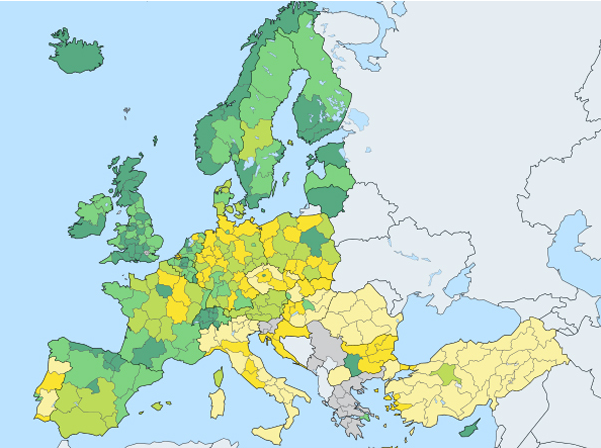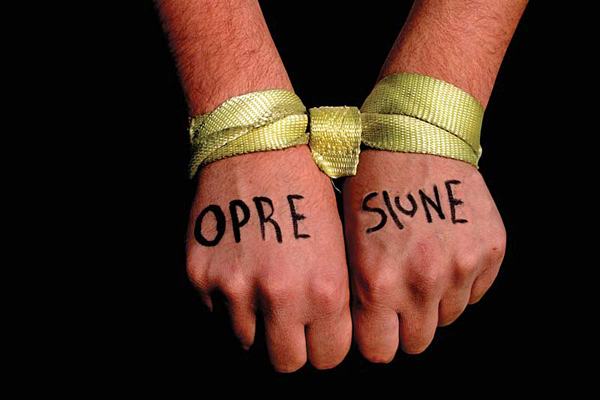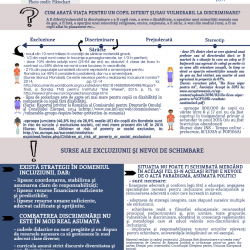Where Is the State and What Is It Doing?
The topic on [non] discrimination or the oppressive system is broadly debated, being put on the same level with the topic on equality. Equality understood as chance, option or possibility, as a wish or as a conceptual extract. However one might grasp it, Romania is a state that discriminates and encourages this kind of phenomenon. Regardless whether you are gay, Roma, expat or anything else, the state, through its absence, encourages discrimination. And its presence is even more oppressive.
Oppressive institutions are present at all the levels of society’s, and in time the state has become more and more powerful, the individual becoming more and more confined and weaker.
Back in the Antiquity, the residents of the polis where subservient to the state and its laws through their citizenship. In time citizenship was institutionalized and the state started to comprise all its citizens into a whole and the main purpose of the state became that of encompassing, subduing and reeducating the citizens, in order to create a unitary culture. Institutions such as the school, the army, the prison, and the church aim to mold the human mind starting as early in life as possible, and also bringing those with deviant behavior on ”the right path”.
Beginning with the first political communities, different manners of punishing and rewarding the citizens emerged and were used by these political formations. Hence, in Ancient Greece, the citizens of the polis had the right to participate in making decisions and the right to rule, while other individuals, even if they were part of that polis, but didn’t have the same interest, were killed or had their rights repealed.
Another important historical period is the modern age, more precisely the 19th century, when due to emergence of nation states and to the firm institutionalization of the concept of citizenship, and up to the 20th century, the state achieved a boost in its attributions thus controlling society even more than before.
The philosophical and political movements, which rose in the same period as the nation states, either emphasized the state’s role or undermined it. It is worth mentioning the liberal theory which looks to decreasing the role of the state not only at the local level, but also at the international one. Theoreticians, such as Adam Smith, claim that the individual’s needs are more important than those of the state. The individual is free to do anything he wants: change goods, values, ideas, travel – without the state being a burden in the individual’s way.
One good example, in which the individual maintains high significance in the state-to-individual report, is the USA. The USA applies the contractualist type of citizenship thus what matters the most are political and civil rights. For them rights take the lead while obligations are less important. On the other hand, there is the social-contractualist citizenship which is based on community and social rights. Thus the rights granted by the community and its impact on the individual rights have a very important role, while obligations are conceived as social responsibilities. However it is not the case of large scale individual liberty even in the USA because the state and its constraint still exist.
This process of institutionalization has led to a restraint of the citizen while his ability to being free is confined. The modern state grants rights and liberties, yet in order to assure them it demands a series of obligations.

Here are some statistical data, sad yet comprehensible:
Eurostat has published a series of data related to the load of people aged 25 to 64 who’ve graduated university, divided by development regions in Europe.
The data is summarized into a map: the greener areas are richer in post-graduates, while the yellow ones comprise fewer. It’s not that hard to notice the Romanian ‘desert’ and its consistency in contrast to the other preponderantly yellow regions – Turkey, Hungary or Italy, which have at least some tinted cracks.
When it comes to the percentages, the Centre is in the best shape, on the 286th place in 330 regions, with 17,8% graduates, followed by the North-West, on the 288th place, the South-West Oltenia is on 294th, the West is placed on 297th, South-East – 319th, the South-Muntenia – 320th and the North-East is on the 323rd place with a percentage of 11,6%.
In Bucharest and the Ilfov county, there are 33,6% graduates, coming in the 116th place, an honorable position, but unfortunately all this only emphasizes the gap between the capital and the rest of the country. As a comparison Prague and Berlin have 40% and respectively 37% university graduates.
The engineers, the doctors and the financial workers provide, at a high level, the human infrastructure that keeps the society moving, the foundation and the rooftop, they make it innovatory, less corruptible, and even prone to take part actively in the collective problems.
At the other side of the society we find the immobility, the submissiveness and the inertia, the maneuverable masses.
The higher education graduates represent the middle class, the core of every society, who consume, develop, and bring development. In our country one of the major consequences for the state of the economy and of the politics of governmental austerity is the fact that Romania has lost its middle class – educated people, with labor power and well instructed, who preferred to go abroad – the sanitary personnel exodus is but one example.
In the desert with shares between 11-17% dwell the corrupt politicians, the careless bureaucrats; the only powerful aspects are the rough force and the vulgarity, while the act of working represents the struggle for survival and not a manner of individual expression meant to enrich the citizen and the society. Further on, we find out that 42% of the high school students are actually functional illiterates, who are not capable of elementary reasoning, cannot use simple arithmetic in their day to day life, and do not understand a text while they read it.
The State is punitive and oppressive while the individual gives up on his civil rights for his and his community’s own good. Practically, the Romanian state maintains and actively sustains acts of discrimination, no matter if direct or indirect, with twin benefits: keeping a society under an oppressive regime results in handier manipulating strings through the same spectrum in which keeping a society uneducated makes it easier to manipulate. This leads to vertical discrimination as I would call it – from the upper layers of public activitiy down to the social classes that are purposely left out.
by Eugen Rădescu
Eugen Rădescu is a politologist (specialized in moral relativism and political ethics), cultural manager, curator and theoretician. He wrote for various magazines and national and international publications.
He was, among other things, the curator for Bucharest Biennale 1, which had the topic of ‘Identity Factories’, for the exhibitions ‘How Innocent is That?’, ‘presently i have nothing to show and i’m showing it!’ and ‘Common Nostalgia’ that took place at Pavilion, in Bucharest. He published a book, ‘How Innocent is That?’ at Revolver Book, in Berlin. He is the co-editor for PAVILION – journal for politics and culture, the co-director of Bucharest Biennale (together with Răzvan Ion) and the president of the organizational board of PAVILION and BUCHAREST BIENNALE. He is a member of the selection board for apexart New York, for the programs ‘Franchise’ and ‘Unsolicited Proposal Program’. He is also the managing director of CREATIVE EVOLUTION, a PR agency specialized on the relation corporate-art.
He gave many lectures and held conferences for diverse institutions, among them being apex, New York; Badisher Kunstverein, Karlshrue; Casa Encedida, Madrid; The Art and Design University, Cluj. At the moment, he is working at the editing of the volume ‘Moral Relativism – two perspectives’. He has a Ph.D. in political science at Babeș-Bolyai Univeristy.
He is an associate teacher at the University of Bucharest and at the Babeș-Bolyai University in Cluj. He lives and works in Bucharest.









